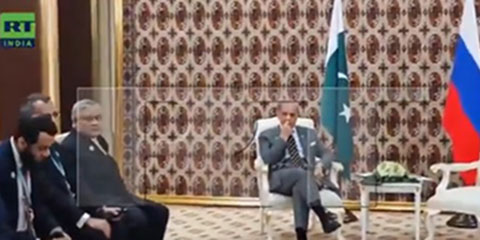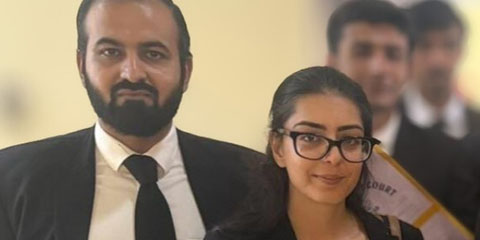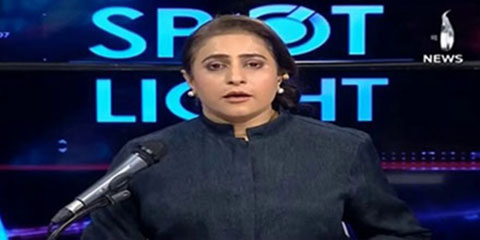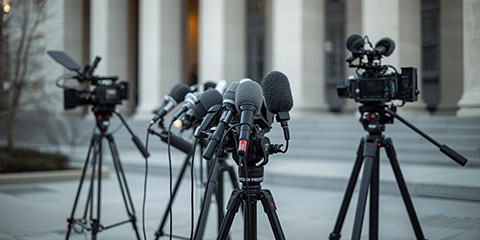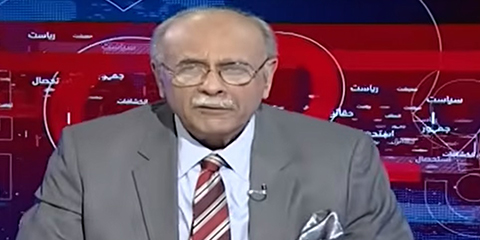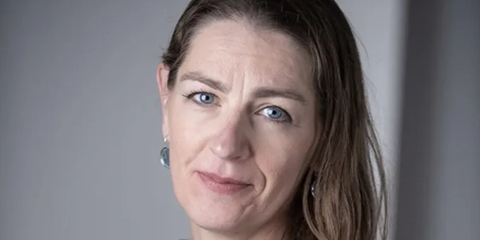Trump as PTI's 'abba'?: The most outrageous media ethics violations in Pakistan
JournalismPakistan.com | Published 4 months ago | JP Special Report
Join our WhatsApp channel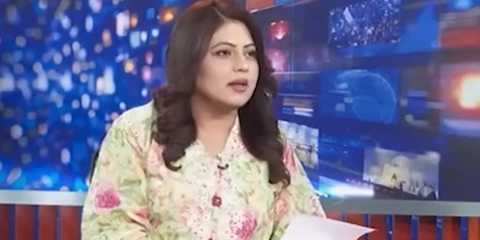
ISLAMABAD—The recent Suno TV talk show debacle, where host Dr. Fiza Khan (pictured) repeatedly referred to Donald Trump as PTI’s "abba" (father), has ignited a firestorm. The bizarre claim that the U.S. president could secure Imran Khan’s release was so outrageous that PTI MPA Sanaullah Mastikhel stormed off the set in protest.
But this was no isolated incident. It was just the latest in a long, shameful history of Pakistani media abandoning ethics for ratings, propaganda, and outright lies.
What started as embarrassing slip-ups has now become something far more sinister. Pakistani newsrooms aren't just getting stories wrong anymore; they're actively putting lives at risk. When channels broadcast false medical advice or spread panic with fake bomb alerts, real people get hurt.
The numbers tell a brutal story: ordinary Pakistanis can no longer trust what they see on their screens. Mothers searching for cancer treatments might follow dangerous advice aired on state TV. Families panic over non-existent terror attacks. Citizens vote based on manufactured government propaganda disguised as news.
The warning signs are everywhere: respected guests walking off sets in disgust, international outlets mocking Pakistani media's credibility, and a generation of young Pakistanis turning to social media because they don't trust traditional news anymore.
The shocking display of unprofessionalism seen on Suno TV is just the tip of the iceberg. JournalismPakistan.com's "Hall of Shame" reveals a disturbing pattern of Pakistani media outlets prioritizing sensationalism over truth and ethics.
April 2012: There's public outcry over the media's failure to properly cover the tragic burial of 138 Pakistan Army soldiers under an avalanche at Siachen Glacier. Initial shock turns to anger as national dailies bury the story and electronic media barely mention it, focusing instead on political scandals.
Failure of News Judgment: The death of 138 soldiers in a single incident at a strategically critical location like Siachen is objectively major news. Relegating it to bottom half of front pages with sketchy reports demonstrates a fundamental misunderstanding of newsworthiness and public interest. It also violates basic journalistic standards of comprehensive reporting on significant events.
June 2012: A scandal involving Dunya TV anchors Meher Bukhari and Mubashar Lucqman sends shockwaves through Pakistan's media landscape. Leaked footage exposes the duo's participation in a staged interview with property tycoon Malik Riaz, revealing a blatant disregard for journalistic integrity.
Manufactured News, A Betrayal of Public Trust: This scandal represents a fundamental breach of journalistic ethics that strikes at the very heart of media credibility. The participation of established television anchors in a staged interview constitutes a deliberate deception of the public, violating the most basic tenets of honest reporting and transparency.
December 2012: The Nation stirs controversy by publishing a front-page photograph deemed highly insensitive. It runs an image of Bashir Ahmed Bilour, a senior ANP leader and Khyber Pakhtunkhwa minister, struggling for life after being targeted by a Taliban suicide bomber in Peshawar. The graphic picture on Sunday's front page draws criticism for its lack of professional judgment.
Dignity in Death Violated: This represents a profound ethical lapse that demonstrates how sensationalism can override basic human decency and professional responsibility. Publishing a graphic photograph of a dying public official, captured in his most vulnerable and tragic final moments, constitutes a grotesque violation of human dignity that no editorial justification can excuse.
December 2012: The year 2012 saw Pakistan's electronic media marred by scandals, from a disgraced televangelist's comeback to TV anchors embroiled in controversies and accusations of bribery, plagiarism, and unethical behavior. These incidents expose the deep-seated issues and lack of integrity within the media industry.
Systemic Professional Corruption: This litany of scandals reveals a media landscape where ethical standards have completely collapsed, replaced by a culture of shameless opportunism and moral bankruptcy. The rehiring of disgraced figures, the rewarding of unprofessional behavior with salary increases, and the tolerance of plagiarism demonstrate how Pakistani electronic media has abandoned its fundamental responsibility to serve the public interest.
April 2013: Following a Supreme Court order, a list of journalists benefiting from Pakistan's Information Ministry's secret fund under the PPP-led government from 2011 to 2012 is disclosed. The disclosure aims to probe government allocations and scrutinize media ethics. It highlights transparency issues and ethical lapses in media governance.
Selling Out the Truth: The revelation that prominent journalists accepted money from the Information Ministry’s secret fund exposes a deep ethical crisis in Pakistan’s media. Journalism’s credibility rests on independence and the public’s trust, yet here we see individuals entrusted with informing citizens instead pocketing taxpayer money from political actors they were meant to scrutinize.
August 2013: For five hours, a single gunman holds Islamabad hostage, captivating television viewers with a bizarre and insulting confrontation. The media's sensationalist coverage of the standoff raises serious ethical concerns. Instead of responsibly reporting the incident, channels compete for ratings, broadcasting every moment live.
Ratings Over Responsibility: The live, wall-to-wall coverage of the Islamabad standoff turned a dangerous criminal act into a grotesque form of entertainment, with television channels treating the ordeal as if it were a reality show. By broadcasting every detail in real time, the media not only risked compromising law enforcement operations but also gave the gunman an unearned platform, feeding his ego and prolonging the crisis.
July 2015: The News journalist Amir Mir is accused of plagiarizing work by Newsweek Pakistan reporter Benazir Shah in an article on Lashkar-e-Jhangvi leader Malik Ishaq. Shah highlights the issue on Facebook, noting that entire passages were copied without attribution.
Plagiarism in Plain Sight: The allegation that a journalist from The News lifted entire passages from a colleague’s work without attribution strikes at the very core of journalistic integrity. Plagiarism is not just theft of words; it is theft of research, effort, and credibility. When a reporter passes off someone else’s work as their own, they deceive readers and betray the profession’s ethical foundation.
July 2016: Express News TV faces backlash after a reporter's unethical live report from Abdul Sattar Edhi's grave. Social media erupts, prompting the channel to apologize and vow corrective action. The incident sparks a widespread debate on journalistic standards.
Desecrating Ethical Boundaries: The decision by Express News TV to air a live report from the grave of Abdul Sattar Edhi reflects a disturbing disregard for basic human decency and journalistic ethics. Such coverage turns a solemn resting place into a stage for sensationalism, trivializing both the sanctity of the site and the legacy of one of Pakistan’s most respected humanitarians.
February 2017: A shocking blunder and collective shame for Pakistani media as 29 TV channels, including Geo, Dunya, and ARY, receive PEMRA notices for spreading false news about a bomb blast in Lahore, highlighting the urgent need for media accountability and ethical reporting.
Falsehoods Over Facts: The mass dissemination of false news about a bomb blast in Lahore by 29 television channels, including major networks like Geo, Dunya, and ARY, is a glaring indictment of Pakistan’s broadcast journalism. In their rush to break the story first, these outlets abandoned the fundamental journalistic duty to verify information, needlessly sowing panic and confusion among the public. Such recklessness not only undermines credibility but also damages public trust in the media as a whole. When accuracy is sacrificed for speed, news becomes rumor, and journalism devolves into a dangerous game of misinformation, proving that without accountability, the pursuit of headlines can lead to collective ethical collapse.
March 2017: Pakistan Electronic Media Regulatory Authority (PEMRA) issues show-cause notices to nine TV channels for airing baseless news regarding a plane crash near Rawalpindi's Kallar Syedan and face fines of Rs one million each. The channels broadcast the erroneous report between 8:00 pm and 9:00 pm, violating regulatory standards.
Irresponsible and Reckless Reporting: The false reporting of a plane crash by nine TV channels is a glaring example of how sensationalism often overrides ethics in Pakistani media. Airing unverified and baseless news not only violates regulatory standards but also betrays the audience’s trust, fuels unnecessary panic, and tarnishes the credibility of journalism as a whole.
April 2017: Pakistan Electronic Media Regulatory Authority (PEMRA) issues a show-cause notice to Channel 92 News for airing a two-year-old clip of a Karachi school function as breaking news. The regulator accuses the channel of misleading viewers by implying indecent activities in schools. The school demands action against the reporter.
Misleading and Malicious Journalism: Channel 92 News airing a two-year-old school event clip as breaking news is a blatant breach of journalistic ethics and a deliberate attempt to mislead viewers. By framing outdated footage in a sensationalized and damaging context, the channel not only distorted the truth but also inflicted reputational harm on the school and its community. Such actions demonstrate a willful abandonment of verification standards, replacing factual reporting with manufactured outrage for ratings. This kind of unethical practice erodes public trust, endangers innocent reputations, and underscores the urgent need for stronger editorial accountability.
July 2017: Dunya Television and DawnNews aired false reports about 158 Indian soldiers being killed in a clash with China in Sikkim, sparking condemnation from Chinese media and the Indian foreign ministry. The incident highlights the issue of fake news, ethics, and the need for responsible journalism.
Reckless Fake News: Broadcasting baseless and unverified claims about a sensitive military clash, as Dunya Television and DawnNews did is not just sloppy journalism, it is dangerously irresponsible. By failing to adhere to the basic principles of verification and fact-checking, these outlets abandoned their duty to inform the public accurately, instead choosing sensationalism over truth. This kind of ethical lapse erodes public trust, fuels misinformation, and underscores the urgent need for stricter editorial standards and accountability in Pakistan’s newsrooms.
May 2018: Sixteen news channels, among them Geo, Dunya, and Samaa get fined Rs1 million each for airing false news claiming the Lahore High Court imposed a ban on speeches by Nawaz Sharif and Maryam Nawaz. Regulator PEMRA issues show-cause notices to the erring channels and orders they broadcast apologies during prime time.
Fabricating Court Bans: This incident underscores a glaring disregard for journalistic ethics, as major news outlets like Geo, Dunya, and Samaa disseminated false claims about a supposed Lahore High Court ban on Nawaz Sharif and Maryam Nawaz’s speeches. Such fabrication not only misleads the public but also undermines trust in the media and the judiciary. While PEMRA’s fines and mandatory prime-time apologies are necessary, they cannot undo the erosion of credibility caused by sacrificing accuracy for headline-grabbing narratives.
July 2019: The News on Sunday publishes a picture of journalist Mariana Baabar Pashteen in an obituary for Zuhra Karim, the late editor of She magazine. The blunder mars a tribute to Karim, a pioneer in women's journalism in Pakistan. Using a living journalist's photo in place of a deceased editor reflects poorly on the newspaper's professionalism.
Careless Editorial Mistake: The publication of Mariana Baabar Pashteen’s photograph instead of that of the late Zuhra Karim in an obituary is a serious lapse in journalistic ethics and professionalism. This careless error not only disrespects the memory of Zuhra Karim, a trailblazer for women’s journalism in Pakistan, but also causes unnecessary confusion and distress. It highlights a lack of fact-checking and editorial oversight that is fundamental to responsible journalism.
October 2019: Aamir Liaquat Hussain, host of 'Public Sub Janti Hai' on Public News, sparks controversy by comparing journalist Raza Abid to Dracula on air. The comment, made during a segment on Maulana Fazlur Rehman's upcoming sit-in, draws condemnation from Shaharyar Khan, a former president of the National Press Club, who demands an apology from the network.
Unprofessional Personal Attack: Aamir Liaquat Hussain’s comparison of journalist Raza Abid to Dracula on live television represents a blatant breach of journalistic ethics and professional decorum. Such personal attacks degrade the standards of public discourse and shift the focus from constructive debate to sensationalism and character assassination.
November 2019: The News faces scrutiny after copying a Dawn story verbatim, including the reference to Dawn itself. The incident, involving PTI leader Barrister Sultan Mehmood's by-poll win, sparks accusations of plagiarism in Pakistani journalism and embarrasses the paper.
Blatant Plagiarism Scandal: The News’s decision to copy a Dawn story word-for-word, even retaining the original reference to Dawn, is a severe ethical violation that undermines the very foundation of journalistic integrity. Plagiarism is not merely an oversight; it is intellectual theft that disrespects the hard work of original reporters and deceives readers about the source and authenticity of information.
March 2020: Journalists and public figures rally behind Marvi Sirmed after a heated exchange with Khalil Ur Rehman Qamar on a talk show about the Aurat March slogan mera jism meri marzi. Calls to ban Qamar from TV shows grow amid widespread condemnation of his abusive behavior.
Disrespect and Intolerance Exposed: This incident highlights a glaring lack of professional ethics and respect in media discourse. Journalists and public figures are expected to uphold principles of fairness, tolerance, and constructive dialogue, especially on sensitive social issues like women's rights symbolized by the Aurat March slogan "mera jism meri marzi." Khalil Ur Rehman Qamar's abusive behavior not only undermines these values but also sets a harmful precedent for public debate.
June 2021: A viral video shows Dr. Firdous Ashiq Awan, Special Assistant to Chief Minister Punjab on Information, slapping PPP parliamentarian Qadir Khan Mandokhel during a heated argument on the talk show 'Kal Takk'. The incident sparks controversy as Dr. Awan alleges Mandokhel used offensive language, while criticism mounts over host Javed Chaudhry's handling of the situation.
Abuse and Ethical Failure: The incident involving Dr. Firdous Ashiq Awan slapping a parliamentarian on live television reveals a serious breakdown in journalistic ethics and professional conduct. Physical violence on a talk show not only undermines the decorum expected from public figures but also sets a dangerous precedent for conflict resolution in media spaces. Moreover, the host's inability to maintain control and de-escalate the situation highlights a lack of responsibility in managing live debates, potentially encouraging sensationalism over reasoned discourse.
August 2021: Dawn newspaper urges the media industry to boycott Khalilur Rehman Qamar for his insensitive comments on Noor Mukadam's murder, questioning the industry's silence and its stance on gender-based violence.
Ethical Hypocrisy and Silence: A glaring lack of ethics rooted in hypocrisy and silence within the media and celebrity circles. While many loudly condemn violence against women and demand justice for victims like Noor Mukadam, their failure to openly denounce Khalilur Rehman Qamar’s blatant misogyny exposes a dangerous double standard. This selective outrage undermines genuine advocacy, turning it into performative virtue rather than principled activism. By continuing to work alongside or tolerate individuals who publicly belittle and attack women, the media and celebrities effectively normalize such behavior, weakening their moral authority. True ethical responsibility requires consistent courage, not just when convenient, and a refusal to shield those who perpetuate harmful narratives, especially in the face of tragic events that demand compassion and respect.
July 2023: ARY News faces criticism and social media backlash for blurring the image of former Prime Minister Imran Khan during his meeting with an IMF representative. The controversial move sparks outrage and calls for boycott on Twitter, highlighting the debate around censorship and media ethics.
Censorship and Biased Editing: ARY News’s decision to blur the image of former Prime Minister Imran Khan during an important meeting with an IMF representative reflects a troubling lapse in media ethics and impartiality. Such selective censorship distorts the facts and manipulates public perception, undermining the media’s fundamental role as an unbiased informer.
October 2023: After initially resisting, DawnNews TV airs an interview of missing PTI leader Sadaqat Ali Abbasi, sparking widespread condemnation and sadness. Senior journalists highlight ethical concerns over interviewing victims of enforced disappearances. The controversial airing raises serious questions about the integrity and freedom of journalism in Pakistan.
Exploiting Trauma Unethically: The decision by DawnNews TV to air the interview of missing PTI leader Sadaqat Ali Abbasi, despite initial resistance, exposes a profound ethical dilemma concerning the treatment of victims of enforced disappearances. Journalistic integrity requires sensitivity and respect when dealing with vulnerable individuals, especially those who have suffered trauma or coercion. Broadcasting such an interview without clear consent or consideration risks exploiting the victim’s plight for sensationalism rather than informing the public responsibly. This approach compromises journalistic freedom by potentially serving as a tool for political manipulation or intimidation, rather than upholding truth and human dignity. Ethical journalism must prioritize protecting vulnerable voices, not exposing them to further harm under the guise of reporting.
July 2024: The recent controversy in Punjab, where actors and social media influencers were paid to praise the government's 100 days in office, raises significant ethical concerns. Such paid promotions undermine the credibility of government achievements.
Astroturfing Undermines Democracy: The Punjab government’s paid endorsement scheme, hiring influencers and actors to manufacture praise for its 100-day performance, exposes a disturbing erosion of public trust. This orchestrated campaign transforms civic discourse into a pay-to-play spectacle, where authentic public opinion is drowned out by scripted applause. By disguising sponsored content as organic support, the state not only deceives citizens but also degrades the very concept of democratic accountability.
August 2024: A viral video exposes a shocking reality about Pakistani media, where fake news circulates unchecked. The clip, featuring a false report on the arrest of former IG of Jails, Shahid Saleem, highlights the pervasive issue of yellow journalism and raises questions about news credibility.
Fabricated News Erodes Trust: The viral video exposing a blatantly false report about former IG Shahid Saleem’s arrest is yet another damning indictment of Pakistan’s unchecked yellow journalism. Such reckless fabrication isn’t just unethical, it actively weaponizes misinformation, eroding public trust in media institutions at a time when credible reporting is most critical.
November 2024: Suno TV faces criticism for targeting senior journalist Matiullah Jan with a smear campaign following his controversial abduction and arrest. This raises serious concerns about media ethics and press freedom in Pakistan.
Targeting Journalists Silences Truth: When media outlets weaponize their platforms to attack colleagues, they abandon ethical obligations and normalize the persecution of truth-tellers. This isn't just unprofessional; it's an assault on democracy itself, sending a chilling message that dissent will be met with character assassination.
December 2024: Geo News faces criticism after a homophobic tweet targeting Richard Grenell, a Trump advisor advocating for Imran Khan's release, which was subsequently deleted.
Homophobic Tweet Backlash: Geo News's homophobic attack on Richard Grenell exposes a disturbing ethical collapse in Pakistani media, where personal prejudice is weaponized under the guise of political commentary. Such blatant discrimination, targeting an individual's identity rather than engaging with their arguments, not only violates basic journalistic standards but also reinforces dangerous societal biases.
December 2024: Pakistan Television airs dangerous medical misinformation, exposing how political propaganda can potentially harm cancer patients by spreading false treatment narratives.
Dangerous Medical Misinformation: PTV's reckless dissemination of unverified cancer treatment claims represents a breach of public trust and media ethics. By platforming baseless assertions that directly contradict established oncology practices, the state broadcaster endangers vulnerable patients who may abandon proven treatments for false hope.
February 2025: The Punjab government faces criticism for spending millions in taxpayer money on misleading front-page advertisements across major Pakistani newspapers, raising serious questions about media integrity and public resource management.
Misusing Public Funds Deceptively: The Punjab government's lavish spending on misleading front-page advertisements represents a gross ethical violation on multiple fronts. By weaponizing taxpayer money to manufacture consent through paid media placements, the administration undermines both journalistic integrity and democratic transparency. This calculated misuse of public funds to peddle propaganda disguised as news distorts public discourse and erodes trust in institutions.
February 2025: The Punjab government's excessive spending on self-congratulatory print advertisements through a 60-page color supplement violates fundamental principles of ethical governance and media integrity.
Tax-Funded Narcissism Epidemic: The Punjab government's squandering of public funds on a 60-page vanity project exposes a disturbing disconnect from governance priorities and journalistic ethics. Flooding newspapers with 300+ images of the Chief Minister isn't public service, it's a state-sponsored ego-trip disguised as information, forcing citizens to pay for their propaganda. This abuse of print media as a personal photo album represents threefold ethical bankruptcy: the exploitation of taxpayer money for political self-worship, the corruption of news spaces into paid infomercials, and the insulting assumption that citizens will mistake quantity of portraits for quality of leadership.
As Dr. Fiza Khan's "Abba Trump" moment goes viral, it is a perfect symbol of how far Pakistani journalism has fallen. What should have been a serious political discussion turned into an international embarrassment, and that's exactly what happens when entertainment value trumps editorial judgment. The question isn't whether Pakistani media can sink any lower, but whether there's still time to climb back up. With each scandal, each fabricated story, each paid advertisement masquerading as news, the country inches closer to a media landscape where truth becomes just another casualty of the ratings war.




